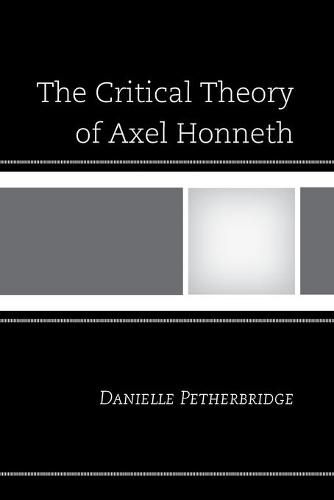Readings Newsletter
Become a Readings Member to make your shopping experience even easier.
Sign in or sign up for free!
You’re not far away from qualifying for FREE standard shipping within Australia
You’ve qualified for FREE standard shipping within Australia
The cart is loading…






The Critical Theory of Axel Honneth provides a comprehensive study of the work of Axel Honneth, tracing the theoretical trajectory from his earliest writings on philosophical anthropology to the development of a theory of recognition. The book argues that Honneth’s early work provides important insights for the reconstruction of the normative project of critical theory and the articulation of a conceptual framework for analyzing social relations of power and domination. Danielle Petherbridge contends, however, that these aims are not fully realized in Honneth’s more mature project and that central insights recede as his project develops. Petherbridge seeks to demonstrate that the basis for an alternative theory of intersubjectivity that can account for both an adequate theory of power and normative forms of subject-formation can be immanently reconstructed from within Honneth’s own work. By contextualizing Honneth’s project in relation to its theoretical influences, The Critical Theory of Axel Honneth provides a critical study and excellent entry point that will be essential reading for both students and scholars who work in the areas of European philosophy, critical theory, social and political philosophy, or social and political theory.
$9.00 standard shipping within Australia
FREE standard shipping within Australia for orders over $100.00
Express & International shipping calculated at checkout
The Critical Theory of Axel Honneth provides a comprehensive study of the work of Axel Honneth, tracing the theoretical trajectory from his earliest writings on philosophical anthropology to the development of a theory of recognition. The book argues that Honneth’s early work provides important insights for the reconstruction of the normative project of critical theory and the articulation of a conceptual framework for analyzing social relations of power and domination. Danielle Petherbridge contends, however, that these aims are not fully realized in Honneth’s more mature project and that central insights recede as his project develops. Petherbridge seeks to demonstrate that the basis for an alternative theory of intersubjectivity that can account for both an adequate theory of power and normative forms of subject-formation can be immanently reconstructed from within Honneth’s own work. By contextualizing Honneth’s project in relation to its theoretical influences, The Critical Theory of Axel Honneth provides a critical study and excellent entry point that will be essential reading for both students and scholars who work in the areas of European philosophy, critical theory, social and political philosophy, or social and political theory.